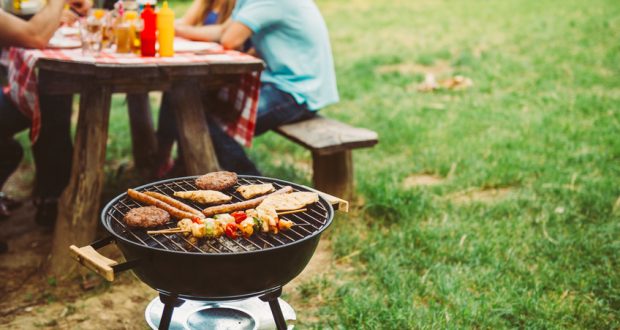Summertime means cook-outs, parties, get-togethers, and lots of food! With all that action (and all that heat) food-borne illnesses are on the rise. These tips will help keep your food, and your family, safe this summer.
For starters, make sure your hands are clean. Always, always, always wash your hands before and after handling food. A simple hand washing under warm water with soap will greatly reduce risk of cross-contamination and food poisoning.
Don’t mix cooked foods with raw ones. Cutting boards and knives must be washed thoroughly after every use with hot, soapy water. Never put the cooked meat on the same plate it marinated on without washing the plate first.
Don’t marinate foods outside or at room temperature. It may be tempting to keep the steaks marinating next to you while you tend the coals on the grill, but leave the meat inside in the refrigerator until you are ready to put it directly onto the heat.
If you want to use the marinade as a basting or finishing sauce, always set aside a small amount prior to marinating the meat. Never reuse the marinade as a sauce for the cooked food.
Cook all food to complete doneness. Make it easy on yourself, and invest in a food thermometer. Meat should reach an internal temperature of 160 degrees F and chicken at least 165 degrees F to be considered safe to consume.
Hot foods need to be kept hot (above 140 degrees F.) If you are not going to eat the food right away, pack it inside a container and put it in the fridge. If the food needs to be reheated, make sure it reaches 165 degrees F.
Food should not sit out at room temperature for more than two hours. In the summer when the air is hotter, it is safer to give yourself a one hour time limit.
With friends and family opening and closing the fridge to get food and drink, it is crucial to ensure that your refrigerator and freezer are set to the manufacturer’s recommended temperature setting. This will ensure your food is being stored at a safe temperature. Cold food should be kept cold, or below 40 degrees F.
Always put raw meats at the very bottom of your refrigerator. This way, if any liquid drains or leaks, it cannot contaminate other foods. Meats always go to the bottom, while fresh fruits, vegetables, cheeses, etc. should be kept on the upper shelves, or in a drawer with no potential cross-contaminates stored on the shelves above.
Clean your fridge regularly. Wipe every refrigerator drawer, shelf, nook and cranny. You can’t see the bacteria that can make you sick, so be sure to cover every inch of space. For example, clean under the pull-out drawers and around the edges of shelves. Don’t forget to also wipe down the outside of your fridge and clean the handle of the refrigerator often.
Try placing an opened box of baking soda on a shelf in the fridge to help keep food odors to a minimum. Use caution when selecting your cleaning solution, you don’t want it to impart any taste or scent onto any of your food, nor cause damage to the interior of your fridge if it is too abrasive. Follow the manufacturer’s recommendations.
Along with a clean refrigerator, give the rest of your kitchen a wipe down, as well. Next up are your kitchen countertops. While you may give counters a quick wipe every day, for spring cleaning, give them special attention by washing them with hot, soapy water followed by a wipe-down with a diluted bleach solution (1 tablespoon of liquid bleach per gallon of water.) For specialty countertops like granite or quartz, be sure to check care instructions before wiping them with bleach or other cleaning solutions.
When was the last time you cleaned the handles on your kitchen drawers and cabinets? Give them the same treatment – hot, soapy water followed by the bleach solution. The same goes for the microwave and oven. Clean both of them thoroughly inside and out to remove any food particles that may be stuck on. Some ovens have a self-clean function; be sure to follow the manufacturer’s instructions closely.
A few final health and safety tips: make sure to have a fire extinguisher in your kitchen (and next to your grill) and that it has been recently inspected and approved as up-to-code. Consider putting a small first aid kit (alcohol wipes, bandages, gauze) in your pantry or under your kitchen sink in case of a cut or burn. If you have little ones or pets around, ensure that your cleaning supplies are stored high out of reach in a locked cabinet.
Now get outside, light up the grill, and enjoy a safe and healthy summer!
Sources:
https://medlineplus.gov/news/fullstory_167095.html
 Diabetic Kitchen
Diabetic Kitchen





Recent Comments